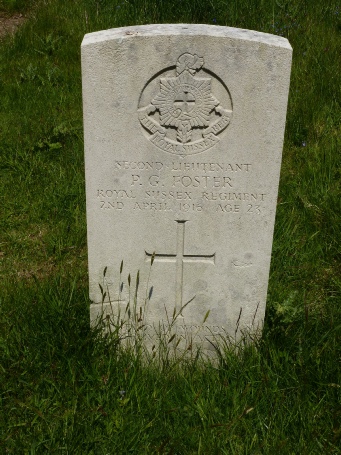Friends of Hastings Cemetery
‘Second Lieutenant P.G. Foster Royal Sussex Regiment 2nd April 1916 aged 23. Died of wounds received in action.’
EH O29 -
Temporary Second Lieutenant Foster, who served with 7th Battalion the Royal Sussex Regiment, died of wounds received in action, in London at the age of 23 on 2nd April 1916. He is buried in Hastings Cemetery in a grave marked with a CWG stone, although not in the war graves section.
He had been in France since 10th July 1915 and appears to have been promoted from the ranks, as he is also listed as being a lance corporal at some point in his army career.
Percy was born in Hastings in 1893 and was the son of Mrs Ada Foster who was living at 1 Alexandra Rd St Leonards at the time of her son’s death. In 1901 the family of mother and two boys was living at 26 Emmanuel Rd. Although Ada is listed as married there is no mention of a husband. Her occupation is given as waitress.
By 1911 Percy was living at 141 Stonefield Terrace Rd, St Leonards with his mother Ada, (born London 1872) and younger brother Cecil (born Hastings 1896). Percy was a builder’s clerk, his mother was a letter of apartments and Cecil was an accounts clerk. Again there is no mention of his father.


Hastings and St Leonards Observer -
Lieut. Percy G. Foster, 7th Royal Sussex, eldest son of Mrs. A. Foster, 44, Alexandra-
The funeral took place on Wednesday. The coffin was conveyed with military honours to London Bridge Station, and from thence, accompanied by Mr. C. W. Foster, by train to Hastings. The train arrived at 1.20 p.m., and a military funeral took place. A short service was held at the Cemetery before the interment. As the coffin was lowered, Mr. C. W. Foster placed three red roses on the coffin, which is the emblem of England's last honour to its fallen hero. The firing party was drawn from the Royal Garrison Artillery, and the scene was most impressive. There was a large number of wreaths from Lieutenant Foster's many relations and friends, amongst them being one from his mother and brother (Mrs. Foster and Mr. C. W. Foster), and a laurel wreath from Miss Taylor.
Lieut. Foster is the first member of the Hastings Y.M.C.A. to fall in the War. Mr. A. Thorpe, chairman of the Association, much regretted that he unavoidably prevented from being present at the funeral to show his respect and sympathy.